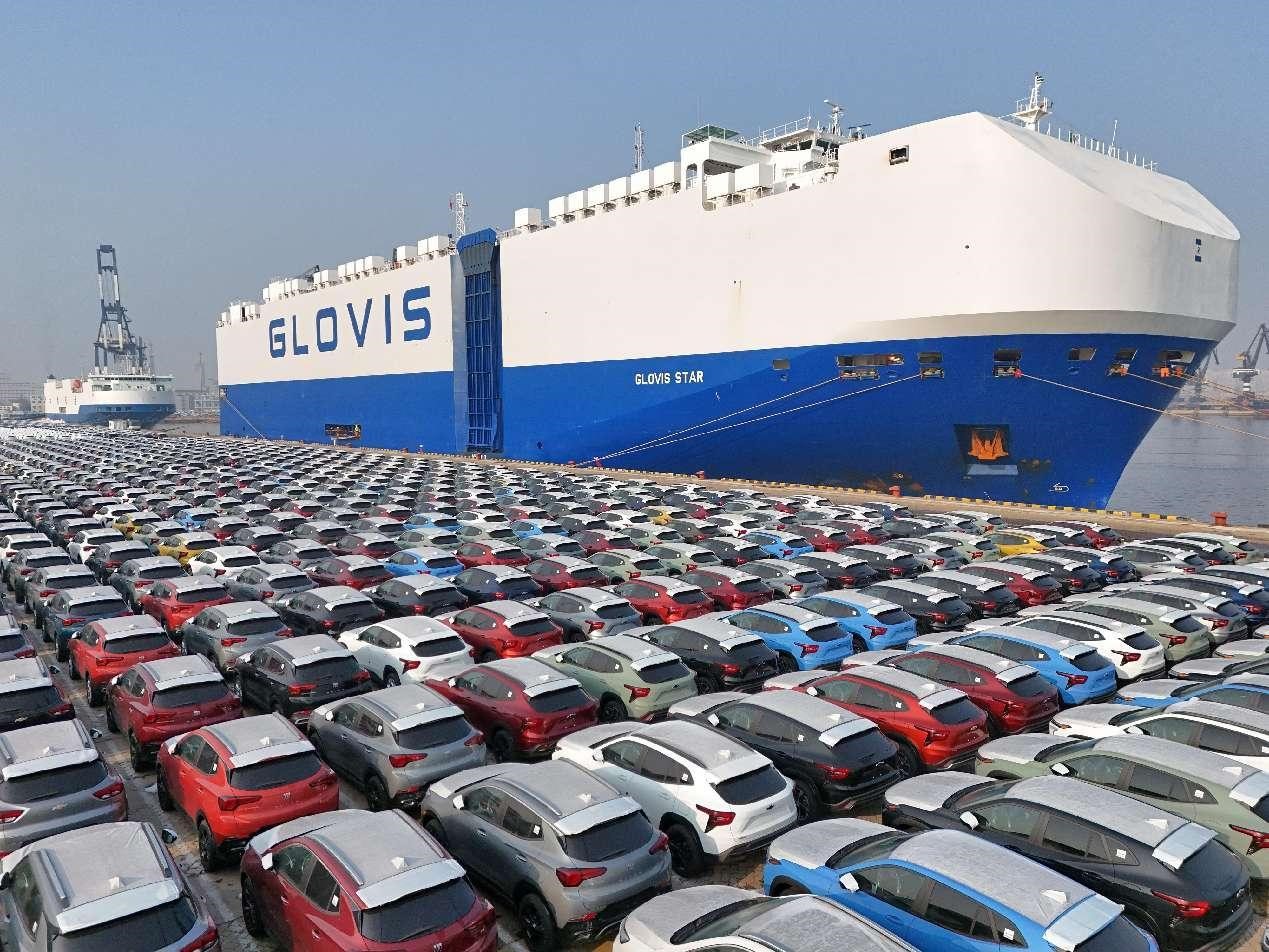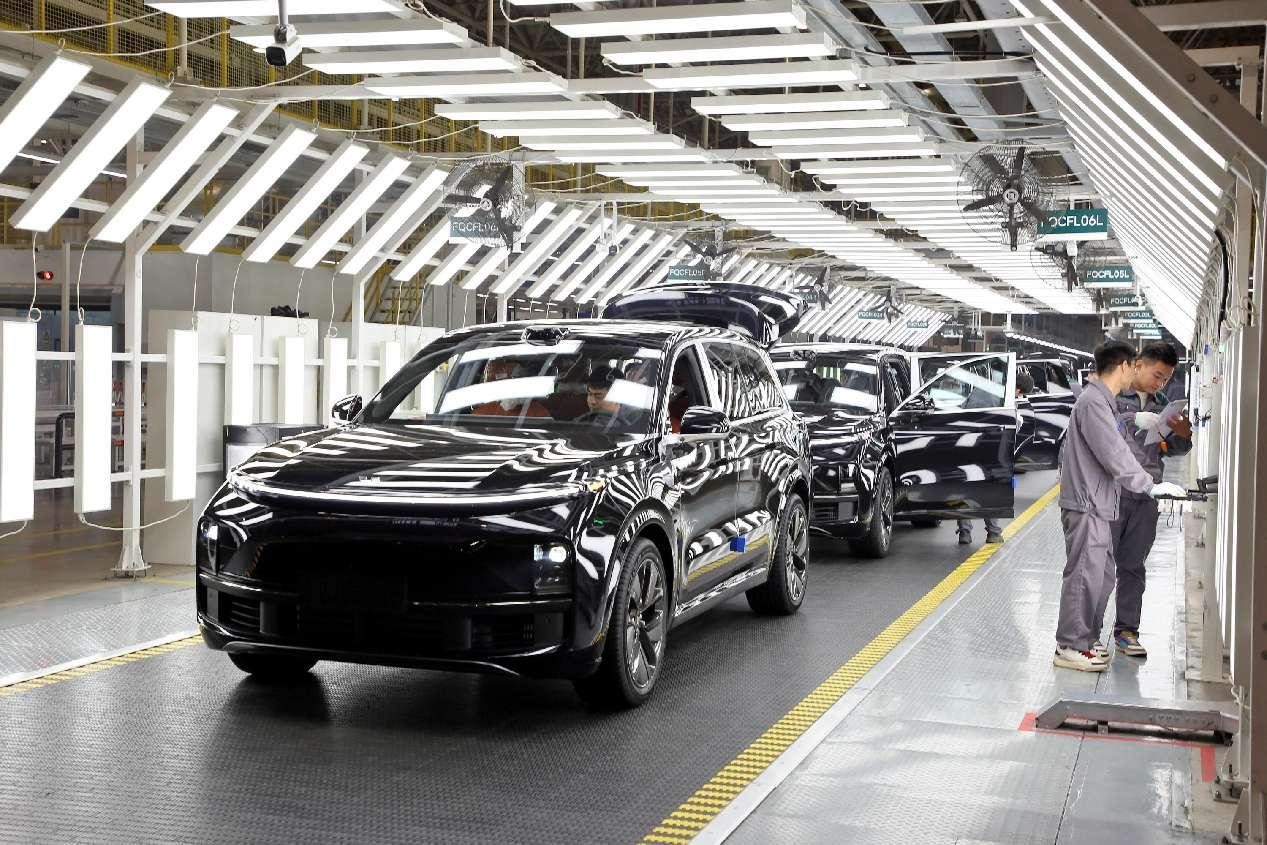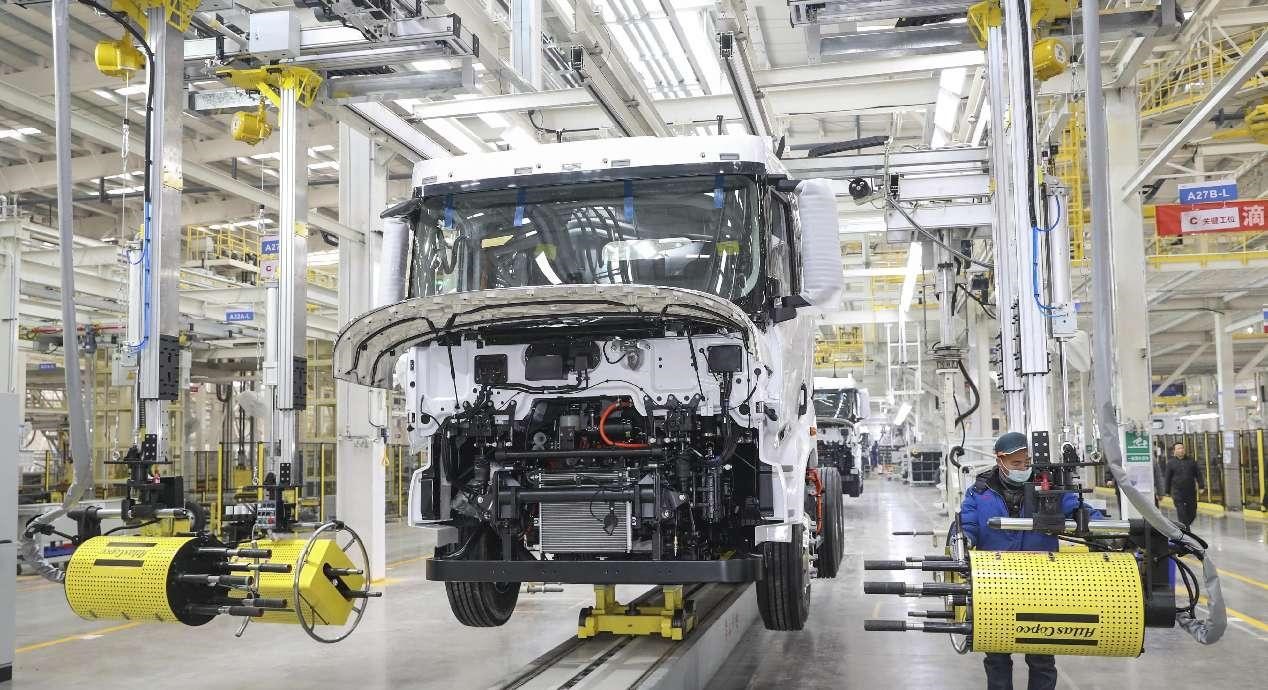Chinese new energy vehicle sector speeds up expansion overseas

China-built vehicles are about to be exported at the Yantai port, east China's Shandong province. (People's Daily Online/Tang Ke)
In 2023, China's production and sales of new energy vehicles (NEVs) exceeded 9.58 million and 9.49 million units, surging 35.8 percent and 37.9 percent year on year, respectively. NEV exports soared 77.6 percent year on year to more than 1.2 million units. These remarkable figures added new splendor to Chinese manufacturing.
In a test building of a global R&D center of Chinese automaker Changan in Chongqing municipality, a 56-day reliability test involving 544 charge-discharge cycles was completed just before the New Year's Day.
"The model Changan CD701 to be launched in the first half of the year will come with an 800V high-voltage platform with silicon carbide technology, which enables the vehicle to run 200 km on a 10-minute charge," said test engineer Liao Xingyu.
In recent years, Chinese NEVs have made great strides in innovations like 800V ultra-fast charging systems, all-in-one electric drive systems, parallel and serial plug-in hybrids, CIB (cell integrated body), "human x car x home" smart ecosystem, and map-less urban assisted driving. China's NEV industry has entered the fast lane of development.
On Dec. 22, 2023, Chinese NEV giant BYD announced its plan to establish an NEV production base in Szeged, Hungary. The construction of this base will be carried out in phases and is expected to create thousands of jobs for the local community.
Prior to this, BYD had also announced a total investment of approximately 4.5 billion yuan ($633.29 million) in a large production complex consisting of three factories in Camacari, Bahia, Brazil. This complex is scheduled to commence production in the second half of this year.
Southeast Asia has also become a hot investment destination for Chinese car companies. On Nov. 8, 2023, the construction of the first phase of a Changan manufacturing base in Thailand officially began. This base is designed to have an annual production capacity of 100,000 vehicles and scheduled to start production in early 2025.

New energy vehicles go through quality check at a production base of Chinese carmaker Li Auto in Changzhou, east China's Jiangsu province. (People's Daily Online/Chen Wei)
Other Chinese car companies that announced plans to build factories in Thailand in 2023 include SAIC Motor, BYD, and NETA. Together, their total planned investment exceeded 10 billion yuan.
Yu De, managing director of SAIC Motor's international business department, noted that SAIC has already established four complete vehicle production bases overseas in Thailand, Indonesia, India, and Pakistan.
In 2023, SAIC Motor sold more than 1.2 million vehicles overseas, representing a year-on-year growth of 18.8 percent, and ranking first among all Chinese peers for eight consecutive years. In particular, SAIC brand MG has entered 28 European countries, with sales in Europe surpassing 100,000 vehicles in 2023.
"SAIC Motor is currently selecting the location for its first complete vehicle production plant in Europe," Yu said.
The accelerated establishment of overseas factories was a major highlight of China's NEV industry in 2023. Chinese NEV startups gaining recognition from international capital also demonstrated China's globally leading position in intelligent electric vehicle technology.
In July 2023, Volkswagen announced that it would acquire a 4.99 percent stake in Chinese EV startup Xpeng via a $700 million capital increase. The two companies also signed a technological framework agreement for long-term cooperation.
Audi signed a memorandum of understanding with SAIC Motor, in which SAIC will leverage its technological advantages to participate in the joint development of new EV models of SAIC-Audi.

New energy vehicles for commercial use are manufactured in a factory of Chinese carmaker BYD in Huai'an, east China's Jiangsu province. (People's Daily Online/Zhao Qirui)
In October 2023, Stellantis, a multinational automotive company ranking among the top five in global sales, announced its strategic investment of 1.5 billion euros in Chinese EV maker Leapmotor. This investment will make Stellantis a strategic shareholder in the Chinese company.
Additionally, the two parties will establish a 51/49 Stellantis-led joint venture, which aims to accelerate the sales of Leapmotor's high-tech and cost-effective products starting from the second half of 2024.
According to Yan Zhaokai, senior manager of die-casting at Xpeng's manufacturing engineering center, what traditional automakers need over 160 parts and multiple production steps to accomplish can be achieved in around 10 minutes with just two machines at the center - one 7,000-ton and one 12,000-ton intelligent die-casting units, along with shaping and cleaning production lines, machining and assembly lines, and online inspection lines.
The all-new process featuring high integration and fewer welds not only significantly improves product performance, but also reduces investment in the body welding line by 30 percent, saves 40 percent of floor space, boosts material utilization to over 97 percent, and greatly shortens production cycle at Xpeng's Guangzhou plant. This ensures stable deliveries.
The high performance, low cost, and high efficiency of integrated aluminum die-casting technology have made it popular among Chinese NEV manufacturing companies, and also nurtured leading domestic die-casting machine companies such as LK Technology and Haitian Die Casting.
It is learned that the intelligent aluminum die-casting unit at Xpeng's Guangzhou factory is currently the world's largest one in terms of tonnage. Among global integrated aluminum die-casting equipment suppliers, LK Technology has the highest market share worldwide.
An official with the Ministry of Industry and Information Technology noted that as China's NEV sector rapidly develops, it integrates various new technologies such as 5G, mobile internet, big data, and artificial intelligence. The industrial chain and value chain are continuously expanding into the fields of transportation, energy, information communication, etc., and an efficient and collaborative industrial system has been established. The automotive industry ecosystem is undergoing a comprehensive transformation.
Photos
Related Stories
Copyright © 2024 People's Daily Online. All Rights Reserved.









